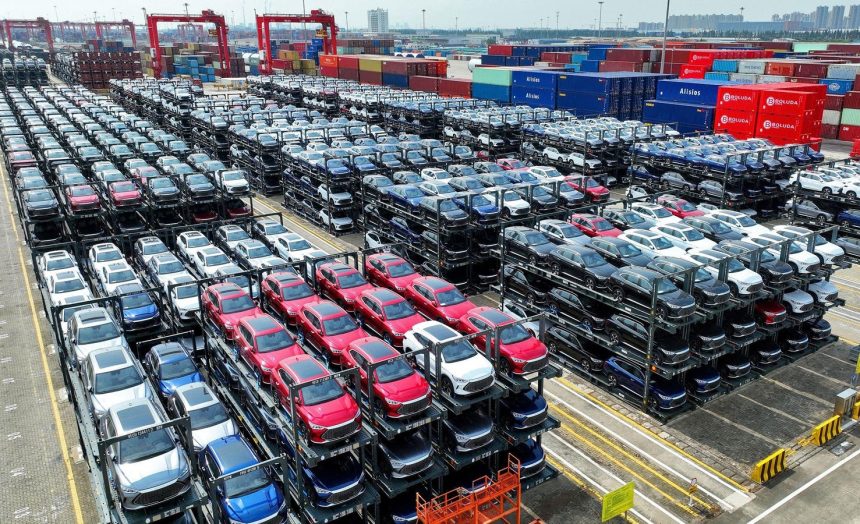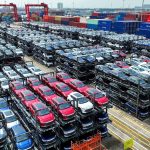The European Union is reportedly close to imposing extra tariffs on Chinese electric car imports because of illegal government subsidies but investors and forecasters don’t expect it to make much difference to sales.
If EU action is harsh, consequences could be of the unintended variety because it could spur Chinese retaliation in the short-term, and persuade its manufacturers to set up more plants in Europe long-term likely to quickly pressurize much less efficient local factories.
Consumers would also end up paying higher prices.
The EU Commission announced last November it would probe alleged subsidies by Chinese companies. SAIC’s MG would be at the forefront of its investigation, the biggest Chinese seller in Europe. The Commission announced earlier this week that it had started a registration process required for it to impose retroactive tariffs. The start day would be March 7, and the Commission could start imposing tariffs in July, backdated to March 7.
The Commission gave no hint of the scale of possible charges.
The import tariff on Chinese sedans and SUVs is currently 10%. Last year Chinese brands sold just over 350,000 sedans and SUVs in Europe, mainly electric ones. MG led the way with 239,000 mainly EVs, about double 2022’s total. BYD sold about 16,000, but it is mounting a big European sales effort, and plans to build a factory in Hungary.
The EU finds itself in a dilemma of its own making. It has decreed the internal combustion engine must die in favor of EVs by 2035, and they will be eliminated as mandatory EV sales quotas are quickly increased. The EU didn’t seem to realize that Chinese manufacturers were about five years ahead of Europeans, and costs were about 30% lower, according to investment bank UBS.
As a result of the EU decision, forecasters reckon EV sales wil reach more than 9 million a year by 2030, up from about 2 million in 2024.
For the EU targets to succeed, much-cheaper Chinese EVs have the inside track. Higher tariffs would raise prices and penalize Europeans. The EU could dilute its targets, but so far hasn’t shown any inclination to change them.
Investment researcher Evercore ISI said Chinese automakers have a capacity of 40 million vehicles a year, and sales of only 30 million, prompting an energetic search for new foreign markets. Evercore ISI forecasts China will capture 10.1% of Europe’s EV sales by 2030, in a report published in February.
Chinese local electric car prices can be as low as $10,000, while prices for EVs in Europe, even for so-called “affordable” ones, often start at around $27,000.
The EU Commission hasn’t said how much the tariff on Chinese imports might be, but any decision will have to weigh the chance of retaliation, said UBS in a report.
“A moderate increase in the import tariff would not change the competitive dynamics much. It also remains to be seen if and to what extent China responds by raising its own import tariffs (currently 10% on EU-made cars) which would negatively affect the German premium/luxury brands Porsche, Mercedes and BMW,” UBS said.
Bernstein Research said it’s likely extra tariffs will be imposed, but the level is unclear.
How big will the new tariff be?
“We see it as highly likely that the European Commission will impose tariffs on some of the Chinese BEV imports going forward. Key question: What is the number? The crucial question that remains is the magnitude of the tariffs, which (the) regulation does not allude to at all,” Bernstein said in a report.
“A crucial question for our autos coverage will be which manufacturers are found to have received anti-competitive subsidies. Who and how much will be the key piece of information we expect in the EC’s findings,” Bernstein said.
A tariff increase might slow Chinese expansion and give Europeans time to catch up in the short-term. However Chinese retaliation might hurt European premium brands.
“Long-term we would expect import tariffs on Chinese cars to accelerate Chinese localization of production in Europe, bringing more production to the stagnant European market creating long-term headwinds (for Europeans),” Bernstein said.
SAIC’s MG would be a likely target of the probe, and any headwinds for it would help competitors like Stellantis, Renault and Volkswagen. Tesla might also be targeted because it accounts for about 30% of Chinese sales into Europe. If China raises tariffs in retaliation, Porsche would be the biggest victim. Bernstein also said if the tariff impact did significantly hit imports from China and it built more factories in Europe, long-term this would negatively impact its manufacturers.
Last year Allianz Trade said Chinese-built EVs could cost European automakers €7 billion ($7.7 billion) a year in lost profits by 2030 unless the EU acts to either raise tariffs, boost battery and other technology, or persuade China to build cars in Europe. Allianz Trade is a subsidiary of German insurer Allianz.
Read the full article here
















